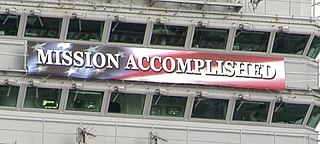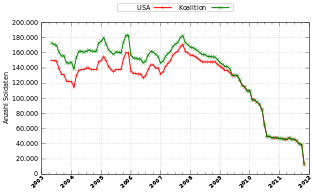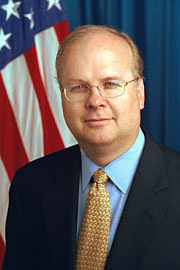
The Bush Doctrine refers to multiple interrelated foreign policy principles of the 43rd President of the United States, George W. Bush. These principles include unilateralism, preemptive war, and regime change.

Lawrence Ari Fleischer is an American media consultant and political aide who served as the 23rd White House Press Secretary, for President George W. Bush, from January 2001 to July 2003.

Robert Upshur Woodward is an American investigative journalist. He started working for The Washington Post as a reporter in 1971 and now holds the honorific title of associate editor though the Post no longer employs him.

Scott McClellan is the former White House Press Secretary (2003–06) for President George W. Bush, he was the 24th person to hold this post. He was also the author of a controversial No. 1 New York Times bestseller about the Bush administration titled What Happened. He replaced Ari Fleischer as press secretary in July 2003 and served until May 10, 2006. McClellan was the longest serving press secretary under George W. Bush.

Helen Amelia Thomas was an American reporter and author, and a long-serving member of the White House press corps. She covered the White House during the administrations of ten U.S. presidents—from the beginning of the Kennedy administration to the second year of the Obama administration.

Robert Ira Wexler is an American politician and lawyer from Florida. He is the president of the Washington-based S. Daniel Abraham Center for Middle East Peace. Wexler was a Democratic member of the U.S. House of Representatives, representing Florida's 19th congressional district, from 1997 until his resignation on January 3, 2010.

William Scott Ritter Jr. is an American former United States Marine Corps intelligence officer, former United Nations Special Commission (UNSCOM) weapons inspector, author, and commentator. He is a convicted child sex offender.

Against All Enemies: Inside America's War on Terror (ISBN 0-7432-6823-7) is a 2004 award-winning book by former U.S. chief counter-terrorism advisor Richard A. Clarke, criticizing past and present presidential administrations for the way they handled the War on Terrorism. The book focused much of its criticism on President George W. Bush, charging that he failed to take sufficient action to protect the country in the elevated-threat period before the September 11 attacks and for the 2003 invasion of Iraq, which Clarke feels greatly hampered the War on Terrorism. The book's title comes from the oath of office taken by all U.S. federal officials, in which they promise to defend the Constitution "against all enemies, foreign and domestic."

Plan of Attack is a 2004 book by the American author and investigative reporter Bob Woodward. It was promoted as "a behind-the-scenes account of how and why President [George W.] Bush decided to go to war against Iraq".

Daniel Joseph Bartlett is an American political advisor who served as counselor to the president and communications director in the administration of George W. Bush.

During the presidency of George W. Bush, several American politicians sought to either investigate Bush for possible impeachable offenses, or to bring actual impeachment charges on the floor of the United States House of Representatives Judiciary Committee. The most significant of these efforts occurred on June 10, 2008, when Congressman Dennis Kucinich, along with co-sponsor Robert Wexler, introduced 35 articles of impeachment against Bush to the U.S. House of Representatives. The House voted 251 to 166 to refer the impeachment resolution to the Judiciary Committee on June 11, where no further action was taken on it. Bush's presidency ended on January 20, 2009, with the completion of his second term in office, rendering impeachment efforts moot.
The Downing Street memo, sometimes described by critics of the Iraq War as the smoking gun memo, is the note of a 23 July 2002 secret meeting of senior British government, defence and intelligence figures discussing the build-up to the war, which included direct reference to classified United States policy of the time. The name refers to 10 Downing Street, the residence of the British prime minister.
The Plame affair erupted in July 2003, when journalist Robert Novak revealed that Valerie Plame worked as covert employee of the Central Intelligence Agency, although the seeds of the scandal had been laid during 2001 and 2002 as the Bush administration investigated allegations that Iraq had purchased Nigerien uranium.

On May 1, 2003, United States president George W. Bush gave a televised speech on the aircraft carrier USS Abraham Lincoln. Bush, who had launched the U.S.-led invasion of Iraq six weeks earlier, mounted a podium in front of a White House-produced banner that read "Mission Accomplished". Reading from a prepared text, he said, "Major combat operations in Iraq have ended. In the battle of Iraq, the United States and our allies have prevailed ... because the regime [the Iraqi dictatorship of Saddam Hussein] is no more." Although Bush went on to say that "Our mission continues" and "We have difficult work to do in Iraq", his words implied that the Iraq War was over and America had won.

Richard Bruce "Dick" Cheney is an American former politician and businessman who served as the 46th vice president of the United States from 2001 to 2009 under President George W. Bush. He has been called the most powerful vice president in American history. Cheney previously served as White House Chief of Staff for President Gerald Ford, the U.S. representative for Wyoming's at-large congressional district from 1979 to 1989, and as the 17th United States secretary of defense in the administration of President George H. W. Bush. He is the oldest living former U.S. vice president, following the death of Walter Mondale in 2021.

Dana Marie Perino is an American political commentator and author who was the 26th White House Press Secretary, under President George W. Bush from September 14, 2007, to January 20, 2009. She was the second female White House Press Secretary, after Dee Dee Myers who served during the Clinton administration.

The Iraq War troop surge of 2007, commonly known as the troop surge, or simply the surge, refers to the George W. Bush administration's 2007 increase in the number of U.S. military combat troops in Iraq in order to provide security to Baghdad and Al Anbar Governorate.

At the Center of the Storm: My Years at the CIA is a memoir co-written by former Director of the Central Intelligence Agency George Tenet with Bill Harlow, former CIA Director of Public Affairs. The book was released on April 30, 2007 and outlines Tenet's version of 9/11, the War on Terrorism, the 2001 War in Afghanistan, the run-up to the 2003 Iraq war, rough interrogation and other events.
Permanent campaign is a political science theory and phrase. The concept of a permanent campaign also describes the focus which recent presidents have given to electoral concerns during their tenures in office, with the distinction between the time they have spent governing and the time they have spent campaigning having become blurred. Political observers who bolster the opinion that a permanent campaign has had a significant impact on recent presidencies argue that decisions by presidents have increasingly been made with considerations to their impact on voter approval. Political observers consider the rise in presidential fundraising as a symptom of the permanent campaign.

Karl Christian Rove is an American Republican political consultant, policy advisor, and lobbyist. He was Senior Advisor and Deputy Chief of Staff during the George W. Bush administration until his resignation on August 31, 2007. He has also headed the Office of Political Affairs, the Office of Public Liaison, and the White House Office of Strategic Initiatives. Rove was one of the architects of the Iraq War.

















